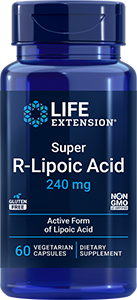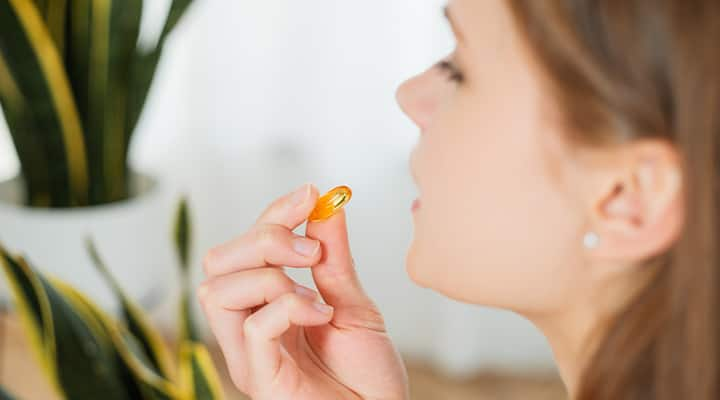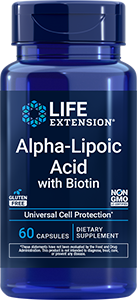
What Are the Benefits of Alpha-Lipoic Acid?
Published: September 2023
What supplements are lining the shelves of your pantry? You might have all sorts of potions and tablets, but there's one dietary supplement that you don't want to sleep on: alpha-lipoic acid (ALA), also called a-lipoic acid.
In this article, let's talk about what ALA is, some of its health benefits, and how you can get more of it.
What is alpha-lipoic acid?
Alpha-lipoic acid is a universal antioxidant. In addition, it can support the regeneration of other antioxidants, like glutathione, vitamin C, and vitamin E.
But why are antioxidants important in the first place? Antioxidants help combat free radicals in the body–and if "free radicals" sound like bad guys, that's because they are. Over time, just like a computer or car that's been running too long, they can stop us from operating optimally.
Free radicals have a number of sources. They're often the result of normal metabolic processes happening inside of us. These metabolic processes can include digesting food and turning fat into energy. Metabolic processes can even include breathing!
Free radicals can cause oxidative stress. And that's why we need antioxidants like alpha-lipoic acid! To be clear, a-lipoic acid isn't the only supplement that can help fight free radicals and oxidative stress. CoQ10, zinc, and selenium are also valiant oxidative stress fighters!
Health benefits of alpha-lipoic acid
We've talked about this antioxidant being good for the body—but in what ways? Here are five health benefits of alpha-lipoic acid!
1. It can support your eye health
As we age, our eye health may need more support. Considering the fact that we're almost always looking at and seeing things, our peepers have a big job to do!
Consuming more alpha-lipoic acid in your diet or via ALA supplementation could support your eye health by increasing antioxidant activity. This is because ALA is able to cross the blood-brain barrier and get into the retina and optic nerve. Considering how active our eyes are on a daily basis, this antioxidant can be of immense help in keeping our eyes healthy.
In a clinical trial of 100 people, ALA was able to support serum levels of something called superoxide dismutase (SOD). This is an enzyme with antioxidant properties, and it can help to encourage vision-related quality of life thanks to how it can support the retina and optic nerve.
2. Alpha-lipoic acid might encourage bone density
Something else that we need to support as we age is our bone health—including how strong our bones are and the general bone mineral density, both of which naturally decline as we age.
ALA can help! Science tells us that this antioxidant could keep your skeleton sturdy over time. Consider adding ALA to your anti-aging supplements.
3. It can help maintain already-healthy blood sugar levels
Let's talk about insulin and glucose for a minute. Glucose is the main sugar that's found in your blood. Sometimes we refer to this as "blood sugar." Insulin—a hormone that the pancreas makes—ushers that glucose into the cells of your muscles, fat, and liver. And from there, it's converted into energy!
This antioxidant might be able to support already-healthy glucose levels. Research has shown that upping your levels of alpha-lipoic acid can have a positive impact on healthy glucose levels.
All of these things are interconnected like a fascinating web, constantly doing this beautiful tango, and ALA plays a very important supporting role in keeping that process on point!
4. It can support a healthy weight
Is weight loss on your list of to-dos? So many of us want to lose weight, but…brownies—am I right?
Alpha-lipoic acid might be the ally you need! One meta-analysis of 10 randomized, double-blind, placebo-controlled studies looked at average weight and BMI change in participants who received the antioxidant versus the placebo groups. Overwhelmingly, participants administered ALA showed small, yet significant, short-term weight loss compared to the placebo groups. No, an ALA supplement won't help with weight loss if you are, indeed, eating those brownies all the time and skipping your workouts. But they are a good complement to a healthy diet and exercise.
5. Alpha-lipoic acid may support a healthy inflammatory response
Having a healthy inflammatory response is vital to your overall wellness and quality of life. One meta-analysis showed that the antioxidant was able to encourage a healthy inflammatory response, as indicated by certain markers like C-reactive protein (CRP) and interleukin-6.
In other words, ALA can help to keep all of these markers in a more optimal range. Thus, alpha-lipoic acid could benefit people by supporting healthy levels of CRP and other markers, and keeping them feeling good.
Explore Our Best Glucose Management / Blood Sugar Supplements
Two Types of Alpha-Lipoic Acid
Now, ALA actually exists in two different forms: R and S. Both are found in supplements.
These forms have different properties. The main difference between them is that R is far more biologically active than S, and it's what gives this antioxidant its "power." R is also what the body naturally produces and uses on its own. However, that doesn't mean that S is bad. In fact, some supplements contain half R and half S.
However, there's a newer form of R-lipoic acid that's proving to be a real powerhouse. It can be converted into sodium-R-lipoate, which is capable of reaching higher blood levels—faster! It's more stable, which means it can absorb more easily into the body and is more bioavailable.
So, while you may see both R and S forms of alpha-lipoic acid, it's the novel form of R-lipoic acid (along with sodium-R-lipoate) that is proving to be a real game-changer.
What foods are high in alpha-lipoic acid?
So, you now know what ALA is and how this antioxidant might be able to help you. Want to up your levels of alpha-lipoic acid? Start with your diet! Increase your intake of foods like:
- Broccoli
- Spinach
- Animal organs (like the liver, kidneys, and heart)
- Red meat
- Peas
- Beets
- Brussels sprouts
- Tomatoes
- Carrots
- Sweet potatoes
- Yams
- Swiss chard
- Yeast
- Rice bran
When it comes to getting more alpha-lipoic acid in your veggies, be mindful of the cooking method. Oftentimes, fully cooking it on the stovetop or in the oven can remove some of the powerful nutrients and minerals that these powerhouse foods contain.
Instead, aim to microwave or steam these items instead of boiling or roasting. Steaming is a great way to lightly cook your food while retaining the flavor and all the healthy "goodies" inside it!
How to take alpha-lipoic acid
A-lipoic acid frequently comes in capsule form. The dosage for Life Extension's Super R-Lipoic Acid is one capsule, which contains 240 mg of R-lipoid acid—although you can increase the dosage to up to two capsules daily.
It's best to take R-alpha-lipoic acid on an empty stomach.
Depending on your specific health goals, you might consider a different type of ALA supplement—such as Alpha-Lipoic Acid with Biotin. This includes vitamin B7 to support liver and nerve health and protect you against oxidation.
When it comes to alpha-lipoic acid supplementation, always follow the directions on the nutrition label unless otherwise instructed by your healthcare provider.
The right dietary supplement can make a world of difference. To support longevity, support your eye health, maintain a good weight, and support healthy blood sugar levels, try an ALA supplement today!
References
- Akbari M, et al. "The effects of alpha-lipoic acid supplementation on inflammatory markers among patients with metabolic syndrome and related disorders: a systematic review and meta-analysis of randomized controlled trials." Nutr Metab (Lond). June 2018. https://www.ncbi.nlm.nih.gov/pmc/articles/PMC5989440/
- Capece U, et al. "Alpha-Lipoic Acid and Glucose Metabolism: A Comprehensive Update on Biochemical and Therapeutic Features." Nutrients. December 2022. https://www.ncbi.nlm.nih.gov/pmc/articles/PMC9824456/
- Carlson DA, et al. "The plasma pharmacokinetics of R-(+)-lipoic acid administered as sodium R-(+)-lipoate to healthy human subjects." Altern Med Rev. December 2007. https://pubmed.ncbi.nlm.nih.gov/18069903/
- Golbidi S, et al. "Diabetes and Alpha Lipoic Acid." Front Pharmacol. November 2011. https://www.ncbi.nlm.nih.gov/pmc/articles/PMC3221300/
- Kowluru RA, Odenbach S. "Effect of Long-Term Administration of α-Lipoic Acid on Retinal Capillary Cell Death and the Development of Retinopathy in Diabetic Rats." Diabetes. December 2004. https://diabetesjournals.org/diabetes/article/53/12/3233/14458/Effect-of-Long-Term-Administration-of-Lipoic-Acid
- Kucukgoncu S, et al. "Alpha-lipoic acid (ALA) as a supplementation for weight loss: results from a meta-analysis of randomized controlled trials." Obes Rev. May 2017. https://www.ncbi.nlm.nih.gov/pmc/articles/PMC5523816/
- Lu SY, et al. "The osteogenesis-promoting effects of alpha-lipoic acid against glucocorticoid-induced osteoporosis through the NOX4, NF-kappaB, JNK and PI3K/AKT pathways." Sci Rep. June 2017. https://www.ncbi.nlm.nih.gov/pmc/articles/PMC5469800/
- Roberts JL, Moreau R. "Emerging role of alpha-lipoic acid in the prevention and treatment of bone loss." Nutr Rev. February 2015. https://pubmed.ncbi.nlm.nih.gov/26024498/
- Rodella U, et al. "Antioxidant Nutraceutical Strategies in the Prevention of Oxidative Stress Related Eye Diseases." Nutrients. May 2023. https://www.ncbi.nlm.nih.gov/pmc/articles/PMC10221444/
- Sharifi-Rad M, et al. "Lifestyle, Oxidative Stress, and Antioxidants: Back and Forth in the Pathophysiology of Chronic Diseases." Front. Physiol. July 2020. https://www.frontiersin.org/articles/10.3389/fphys.2020.00694/full
- Tao Y, et al. "α-Lipoic Acid Treatment Improves Vision-Related Quality of Life in Patients with Dry Age-Related Macular Degeneration." Tohoku J Exp Med. November 2016. https://pubmed.ncbi.nlm.nih.gov/27840374/
Always be in the know!
Access the latest deals, wellness news, expert health tips & more!












